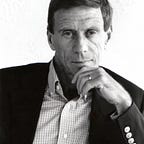Barbara Ehrenreich — her life, her example
I have arrived at an age where I find myself blindsided by obituaries of people who are my peers. It happened yesterday when I read of the death of Barbara Ehrenreich. This one was a real kick in the stomach.
I had followed her writing for decades, and along the way I met her a couple of times. We traveled in some of the same orbits, she a major planet and me a small moon. She was someone I always read and listened to expecting to learn something important. I was never disappointed.
No aspect of history is as hard to grasp as the part that’s passing now, and she was damn good at it. American has changed a lot in the past fifty years, the years in which she was writing. It has changed in ways that are apparent and in ways that are harder to see. She had her finger on the pulse of American society as well as anyone.
When I puzzled over the corrosive anxiety of professional middle class families awash in reasons to feel blessed and secure, I read Fear of Falling and began to understand. The Hearts of Men furnished new insights into changing gender roles. When I figured it must be hard to live on minimum wage, I read Nickel and Dimed: On (Not) Getting By in America and gained a visceral sense of what it was really like. That was the book that showed Barbara at her best. She embarked on a pilgrimage of working as a hotel maid, a cleaning woman, a nursing-home aide, a worker at Wal-Mart. She lived in residential motels and trailer parks. Then she wrote about it in the clear American plain-speak that made her so readable. She told the story with compassion, economic smarts, cultural insight — and sharp humor. She could be laugh-out-loud funny!
Reading Barbara Ehrenreich always moved me closer to understanding where our history was and where it was going. One of the keys to her success was what Bryan Stevenson speaks about as proximity, the necessity of being up-close-and-personal to what you want to understand. As he says, “You cannot be an effective problem-solver from a distance. There are details and nuances to problems that you will miss unless you are close enough to observe those details.” She got close to her subject.
As academic leftist writing became ever more characterized by jargon, obtuse theory, muddy writing, and self-righteous moralism, Barbara Ehrenreich’s writing and speaking were always an invigorating breath of fresh air. Her books were a model. I hope they remain so.
The body of work Barbara Ehrenreich leaves us — along with the memory of one hell of a good person — stands as an example how much truth matters and how we can best discover it.
